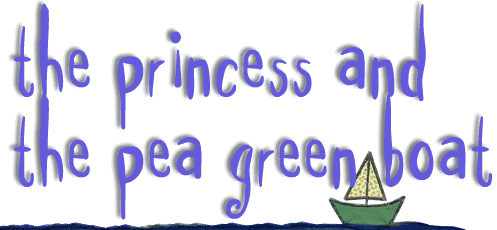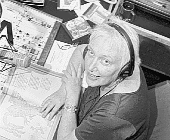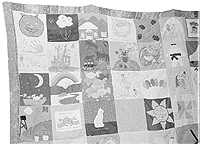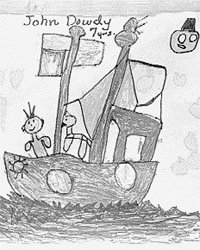
by Susanna Sonnenberg
Without warning, I am holding a book called 112 Cat and Dog Jokes. Marcia Dunn-a few hours ago only a voice-beams as she turns from KUFM’s control board, pushes over the mike and asks me to tell her a joke.
 |
|
Marcia Dunn |
I read, “What kind of dog eats twice as much as any other dog?”
Marcia raises her eyebrows and ponders the question aloud. Finally, she gives up. “What kind?”
“A chow chow,” I say.
She laughs enthusiastically and means it. The fact that Marcia-it is impossible to call her anything more formal-has transformed her shyness about being interviewed into a dog joke is typical. On the air since 1979 at The University of Montana’s public radio station, she has, in her words, “tried everything but mimes” on the open-ended format of “The Pea Green Boat.” Trained by years of innovation with virtually no budget, Marcia knows intimately and intuitively what will work on KUFM’s hugely popular afternoon children’s show that is named after the boat in Edward Lear’s The Owl and the Pussycat and is the longest-running children’s program in the nation. With warmth, humor and a pleasure unnervingly genuine, she conveys the sense that even her daily walk to work can be fun for those who listen.
The program, honored by organizations ranging from Family Circle magazine to the Bahai, features a fanciful mix of songs and stories, guests who specialize in bats and bunnies, guests who are wolves or llamas, bad jokes and good recipes, and frequent air time for the song “Little Potato,” which is a chart-buster by children’s broadcasting standards.
But it is Marcia herself who transforms the show into something more than background radio. She wears bright, comfortable clothes and silver earrings shaped like moose. Her hair is clipped stylishly close to her head, and her laugh is generous. She easily disarms me, “the professional,” by teasing herself. “Raquel Welch and I used to be the same age,” she says. “Now she’s four years younger.”
It’s ten minutes past four on a summer afternoon. I have stepped into the special world that is broadcast daily into my living room.
Entertainment as Education

Squares for this quilt were sent in by "Pea Green Boat" listeners.
“Marcia knows there’s nothing wrong with living in a child’s world for an hour a day,” says Missoula bookseller Barbara Theroux. “She’s very much at ease with herself.”
This level of comfort defines Marcia’s on-air persona, which in its candor and warmth closely resembles her real self. “To be on the air is a performance of sorts,” says William Marcus, a twenty-year KUFM veteran who directs UM’s Broadcast Media Center. “But the really successful radio personalities don’t let their radio personalities become something that they aren’t.”
Marcia gives entertainment priority over “education” in her programming because pleasure, she believes, penetrates deeper than a sermon. On one afternoon, she weaves an entire broadcast of songs and stories prompted by one listener’s request for “a why song.” “I know the material and I can get my hands on it,” Marcia explains. “I think of a child asking that question, ‘Why?’ and it just tickles me that I can do this. I can indulge the child and not everybody in every job can.”
From Fish Jokes to
Family Stories
Marcia presented herself to Station Manager Terry Conrad in 1979 after her son Christopher, then six, heard that “The Pea Green Boat” needed a new host. (“Now he thinks I owe him big time,” she laughs.) She had studied children’s literature, had taught fourth grade in Chicago and had told stories on the Missoula Public Library bookmobile, but Marcia had no experience in broadcasting.
“I had the good fortune to say yes when she wanted to work here,” Conrad says. “She’s been a joy to have on the air. She does children’s programming exceptionally well because she’s exceptionally talented. She has a way of treating the children with a genuine concern for the kind of lives they’re having. She talks to kids as people.”

Marcia took over the show from Germaine Conrad, who left to run for public office. At that time the show was composed of half an hour of “The Spider’s Web,” a children’s show from Boston, and half an hour of songs and stories. “When we lost “The Spider’s Web,’ I saw it as a big opening,” Marcia says. Gradually she began incorporating different features into the programming-visits from naturalists, poetry readings, even contests. “With my contests,” she says, “anyone who enters gets something because I can’t bear for a child not to win.”
When asked about any major on-air faux pas, she admits that she once “gave up the goods on the tooth fairy.”
But Marcia’s favorite subject is family stories. “I’m always looking for new ones, or new versions of old ones,” she says. “They have to be jewels.” She recently presented her eighty-three-year-old father-who raised Marcia and her brother in Chicago-with a tape recorder so that he could record family stories. “My mother died when I was seven, and he’s the only one left in my life who knows anything about her,” she says. “I remember she sewed all my clothes, and she was an excellent seamstress and cook. I remember her getting sick and getting her last rites.
“Recently I was looking at a portrait of me and my mother, taken when I was about five, and I realized this was a time in my life when I was like all other children: I had a mother and a father. I wasn’t the girl without a mother, the one with a housekeeper, the one with the new stepmother. I was just an ordinary little kid.”
Two Generations of Listeners
Children around western Montana have grown up with Marcia’s gentle, encouraging voice. Although KUFM does not do listener surveys, Kay Wilson, the station’s director of development, says the show is one of the top money-makers during Public Radio Week.
“In order to have a program on the air for two decades and for it still to be the success that it is-and we’re moving into a second generation of listeners-there has to be a real connection between the radio personality and the listeners,” Marcus says. “She has that direct allegiance like no one else here.”
Children often stop by KUFM to tell her about a new pet or ballet slippers or they bring in a decorated square for one of the quilts she pieces together every year. “This is a great joy to me,” Marcia says of her interaction with the audience. “The people I have met that I would never have met, the stories and jokes I hear-these are the nicest things about the job.”
“Marcia is many things to many people, depending on their age and state of mind,” Theroux says. “To youngsters, she introduces wonderful new words and songs and discussions. And she takes adults down memory lane.” Listeners stay in touch from far away, calling in to announce a good grade in high school or the birth of a new baby.
For the listeners of “The Pea Green Boat,” Marcia is public radio. She is the voice that seeps into the room, the welcome guest in late afternoon that settles comfortably each day on the living room couch. Shortly after the birth of my son, I made my first call and requested Burl Ives’ version of “The Fox.” Marcia’s voice rose with happy recognition. “I think I can find that!” she said. Within minutes, she had a worn and scratchy recording on the air. The connection was instantaneous, the comfort enormous. M
Susanna Sonnenberg and her one and a half year old son are devoted listeners to “The Pea Green Boat.”![]()